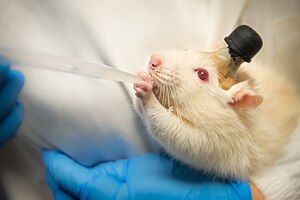World Day for Animals in Labs: Difference between revisions
WikiAnimal (talk | contribs) No edit summary |
No edit summary |
||
| (4 intermediate revisions by 2 users not shown) | |||
| Line 1: | Line 1: | ||
World Day for Animals in Labs is an annual event observed on April | [[File:Feeding a laboratory rat.jpg|alt=World Day for Animals in Labs|thumb|World Day for Animals in Labs]] | ||
'''World Day for Animals in Labs''' is an annual event observed on April 24 to raise awareness about the use of animals in scientific experiments and to promote alternatives to animal testing. It is also known as World Laboratory Animal Day. | |||
The day is dedicated to highlighting the suffering and cruelty that animals endure in laboratories, including mice, rats, dogs, cats, primates, and other species. It also serves to highlight the need to develop alternative methods, such as computer modelling, cell cultures, and other non-animal testing techniques, | The day is dedicated to highlighting the suffering and cruelty that animals endure in laboratories, including mice, rats, dogs, cats, primates, and other species. It also serves to highlight the need to develop alternative methods, such as computer modelling, cell cultures, and other non-animal testing techniques, | ||
| Line 5: | Line 6: | ||
== See also == | == See also == | ||
* [[Save | * [[Save Ralph - film]] | ||
* [[Animal awareness days]] | |||
== External links == | |||
* https://worlddayforlaboratoryanimals.org/ | |||
[[Category:Animal awareness days]] | [[Category:Animal awareness days]] | ||
Latest revision as of 21:35, 3 February 2024

World Day for Animals in Labs is an annual event observed on April 24 to raise awareness about the use of animals in scientific experiments and to promote alternatives to animal testing. It is also known as World Laboratory Animal Day.
The day is dedicated to highlighting the suffering and cruelty that animals endure in laboratories, including mice, rats, dogs, cats, primates, and other species. It also serves to highlight the need to develop alternative methods, such as computer modelling, cell cultures, and other non-animal testing techniques,
